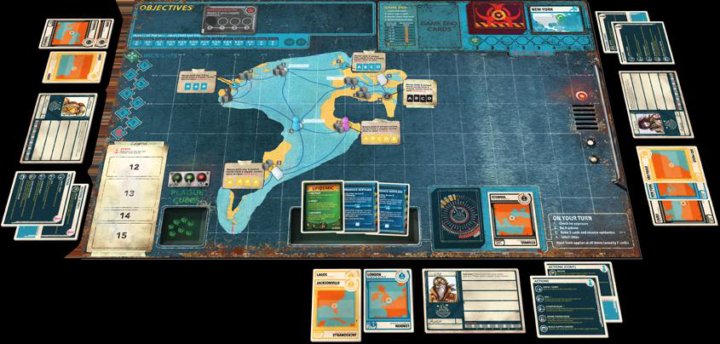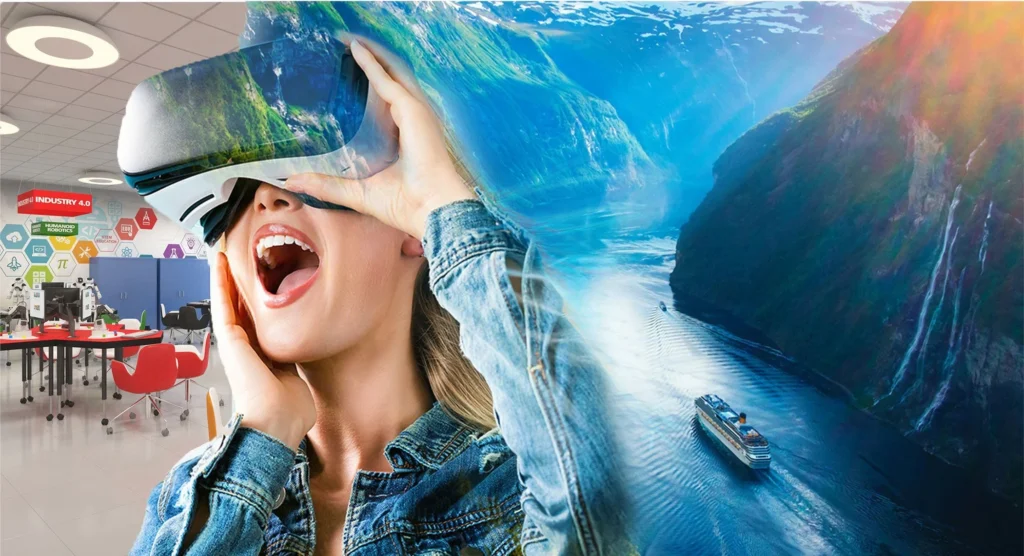The travel industry stands at the brink of a technological revolution.
Virtual reality (VR) has emerged as a game-changing force that’s reshaping how we explore destinations, plan trips, and experience travel.
From allowing customers to walk through hotel rooms before booking to creating immersive tourism experiences for those who can’t physically travel, VR technology is transforming every aspect of the travel and tourism ecosystem.
This digital transformation isn’t just about fancy gadgets—it’s about democratizing travel, making destinations more accessible, and creating sustainable tourism solutions that benefit both travelers and the planet.
Let’s explore how VR is redefining the future of travel and what this means for travelers, businesses, and the industry as a whole.
Evolution of Virtual Travel Experiences
Virtual travel experiences have evolved from simple 360-degree photos to sophisticated, immersive environments that engage all our senses.

Modern VR technology creates digital tourism opportunities that were unimaginable just a decade ago. Users can now explore ancient ruins, walk through bustling markets, or stand atop mountain peaks—all from their living rooms.
These immersive tourism experiences utilize advanced VR headsets, such as the Oculus Quest and PlayStation VR, to transport users to distant locations.
The technology has become so sophisticated that many travelers report feeling genuinely present in these virtual environments, complete with spatial audio and haptic feedback that makes the experience remarkably realistic.
Companies like Google Earth VR and National Geographic have pioneered virtual sightseeing experiences that allow users to fly over landmarks, dive into ocean depths, or explore historical sites.
These platforms demonstrate how VR tourism can complement, and sometimes replace, traditional travel experiences.
Transforming the Customer Journey
Pre-Trip Planning Revolution
VR technology has revolutionized pre-trip planning by offering “try before you fly” experiences. Travelers can now virtually tour destinations, explore hotel rooms, and even test activities before making booking decisions. This capability reduces uncertainty and increases confidence in travel purchases.
Travel agencies report that customers who experience VR previews are 40% more likely to book trips and show higher satisfaction rates. The technology allows travelers to:
- Take virtual tours of hotel rooms and facilities
- Explore destination highlights and attractions
- Preview restaurant atmospheres and dining experiences
- Test adventure activities like zip-lining or scuba diving
- Navigate transportation options and routes
Interactive Booking Experiences
Virtual booking platforms are revolutionizing the way travelers research and book trips. These platforms combine VR experiences with booking functionality, allowing customers to explore destinations while simultaneously checking availability and prices.
Major hotel chains like Marriott and Best Western have implemented VR experiences in their booking process.
Customers can virtually walk through rooms, explore amenities, and even experience local attractions before finalizing their reservations. This interactive approach has increased booking conversion rates by up to 30% for participating properties.
Accessibility and Inclusive Tourism
One of VR’s most significant contributions to travel is its ability to make tourism accessible to everyone, regardless of physical limitations, financial constraints, or geographical barriers.
Breaking Down Physical Barriers
VR technology creates opportunities for people with disabilities to experience destinations that might otherwise be inaccessible. Wheelchair users can virtually climb mountains, visually impaired travelers can experience visual destinations through audio descriptions and haptic feedback, and those with mobility challenges can explore remote locations without physical strain.
Museums and cultural sites worldwide are developing VR experiences specifically designed for accessibility. The Louvre offers virtual tours with enhanced audio descriptions, while Machu Picchu provides accessible virtual experiences for visitors who are unable to navigate the challenging terrain.
Economic Accessibility
Virtual travel experiences also address economic barriers to tourism. Not everyone can afford international flights or luxury accommodations, but VR makes it possible to experience these destinations affordably.
This democratization of travel experiences opens new possibilities for education, cultural exchange, and personal enrichment.
Business Applications and Industry Impact
VR Marketing Campaigns
Travel marketing has been transformed by VR technology. Destination marketing organizations and tourism boards now create immersive campaigns that allow potential visitors to experience locations firsthand. These VR marketing strategies generate emotional connections that traditional advertising cannot match.
Thailand’s Tourism Authority created a VR campaign allowing users to experience floating markets, temple visits, and beach resorts. The campaign generated a 50% increase in travel inquiries, demonstrating VR’s power as a marketing tool.

Tools for Travel Agencies and Tour Operators
Travel agencies and tour operators are integrating VR into their sales processes. Virtual reality showrooms enable agents to provide immersive previews of destinations, allowing clients to visualize their trips more effectively. This technology has proven particularly valuable for:
- Selling honeymoon packages through romantic VR experiences
- Marketing adventure tours with thrilling virtual previews
- Showcasing luxury accommodations and amenities
- Training travel agents about destinations they haven’t visited
Tour operators report that VR demonstrations increase sales conversion rates by 25-35% compared to traditional brochures and videos.
Virtual Reality Training
The travel industry utilizes VR for employee training, particularly in the hospitality and customer service sectors. Hotel staff can practice handling various scenarios, while tour guides can learn about destinations without having to travel. This application reduces training costs while improving service quality.
Sustainable Tourism Through VR
Virtual reality offers solutions to the issues of over-tourism and environmental concerns that plague popular destinations. VR tourism can reduce the carbon footprint of travel while still providing meaningful experiences.
Reducing Environmental Impact
Virtual travel experiences significantly reduce carbon emissions associated with traditional tourism. One virtual trip generates approximately 0.1% of the carbon emissions of an actual flight.
As climate consciousness grows, VR offers an eco-friendly alternative that satisfies wanderlust without environmental guilt.
Protecting Fragile Destinations
Some of the world’s most beautiful destinations are suffering from over-tourism. Places like Venice, Barcelona, and various natural parks are implementing VR experiences to provide access while protecting these locations from physical damage. Virtual tourism allows unlimited visitors without environmental impact.
Sustainable Travel Planning
VR helps travelers make more sustainable choices by allowing them to research eco-friendly accommodations, transportation options, and activities before booking.
This preview capability encourages more thoughtful travel decisions that align with sustainability goals.
Metaverse and Future Travel Experiences
The concept of metaverse travel is expanding beyond simple VR experiences to create persistent virtual worlds where travelers can meet, explore, and share experiences together.
Social Virtual Travel
Platforms like VRChat and Horizon Worlds enable social virtual travel where friends and family can explore destinations together regardless of their physical locations. These shared experiences create new forms of travel that blend social media with virtual tourism.
Virtual Travel Communities
Online communities are forming around virtual travel experiences, where users share virtual destinations, create travel guides for VR experiences, and organize group virtual tours. These communities demonstrate how VR is creating entirely new forms of travel culture.
Post-Pandemic Travel Adaptations
The COVID-19 pandemic accelerated VR adoption in travel as physical restrictions limited traditional tourism. Many developments that emerged during this period continue to shape the industry.
Health and Safety Previews
VR now allows travelers to preview health and safety protocols at destinations before visiting. Hotels showcase their cleaning procedures, restaurants demonstrate social distancing measures, and attractions show capacity limitations through virtual tours.
Hybrid Travel Experiences
The pandemic created demand for hybrid travel experiences that combine virtual and physical elements.

Travelers might virtually explore a destination before visiting, then use AR applications to enhance their on-site experience with additional information and interactive features.
Technology and Equipment Considerations
The effectiveness of VR travel experiences depends heavily on the quality of technology and equipment used.
VR Headset Options
Modern VR headsets offer varying levels of immersion and accessibility:
- Oculus Quest 2: Wireless, user-friendly, suitable for most travel VR applications
- PlayStation VR: Console-based, excellent for gaming-style travel experiences
- HTC Vive: High-end option for professional applications and detailed experiences
- Mobile VR: Smartphone-based options for basic virtual tours
Supporting Technologies
Augmented reality (AR) complements VR in travel applications. AR apps can overlay information on real-world environments, providing enhanced experiences for travelers already at destinations.
This technology bridges the gap between virtual preparation and physical travel.
Future Trends and Innovations
Several emerging trends will shape the future of VR in travel:
Artificial Intelligence Integration
AI-powered VR experiences will provide personalized virtual tours based on individual interests and preferences. These systems will learn from user behavior to create customized travel experiences that match personal tastes.
Enhanced Sensory Experiences
Future VR systems will incorporate smell, taste, and temperature elements to create even more immersive experiences. Research is ongoing into scent delivery systems and haptic suits that can simulate temperature and texture.
Real-Time Virtual Tours
Live-streaming VR tours will allow users to experience destinations in real-time with local guides. This technology combines the immediacy of live video with the immersion of VR.
Conclusion
Virtual reality is fundamentally transforming the travel and tourism industry by making experiences more accessible, sustainable, and engaging. From revolutionizing pre-trip planning to creating entirely new forms of virtual tourism, VR technology offers solutions to many challenges facing modern travel.
The impact extends beyond individual travelers to benefit businesses through improved marketing capabilities and operational efficiencies. As VR technology continues to advance, we can expect even more innovative applications that will further reshape how we explore and experience the world.
As we move forward, the integration of VR in travel will likely become seamless, with virtual and physical experiences complementing each other to create richer, more accessible, and more sustainable ways to explore our world.

